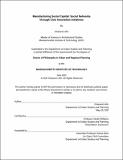Manufacturing Social Capital: Social Networks through Civic Innovation Initiatives
Author(s)
Ahn, Chaewon
DownloadThesis PDF (91.37Mb)
Advisor
Williams, Sarah
Terms of use
Metadata
Show full item recordAbstract
The gentrification of industrial land in post-industrial cities is a driving force to displace urban manufacturing firms from cities. Entering the 2010s, manufacturing clusters started to be rebranded as innovation districts that connect manufacturers to entrepreneurs, designers, and artists to develop innovative products with a renewed attention on the rapid and flexible prototyping techniques in the area. This research takes the Sewoon area in the center of Seoul, South Korea as a case to evaluate the efficacy of the network-building innovation programs. The dissertation questions whether and how artificially created new networks can enhance the firms’ innovative capacity and also strengthen the power and agency of manufacturing communities in the planning process to challenge state-sanctioned industrial gentrification.
Combining social network analysis, interviews, and ethnographic fieldwork on the “Remake Sewoon” project, I investigate, 1) how the innovation projects, planned and implemented by governance working groups create collaborative relationships with firms structurally and culturally embedded in the local economy; 2) whether firms with strong innovative potential that occupy “structural holes” in these innovation networks also “bridge” heterogeneous industries to promote inclusiveness; and 3) how the governance working groups utilize these bridging and linking networks between the community and the city government in the negotiation of a controversial zoning rule that threatens the manufacturing community.
I argue that the network-building innovation programs create concentrated opportunities for new industries that lead to serious pitfalls as this weakens the overall power against industrial gentrification. In a context in which strong firm embeddedness of traditional firms act as barriers against their inclusion in innovative networks, innovative opportunities and access to vertical power are focused on the new industries. This compounds the vulnerabilities of traditional industries and jeopardizes the sustainability of the innovation programs in the long run. As a result, I find that the innovation networks embedded in top-down planning reinforce city ideologies and power, despite the governance working groups’ effort to mitigate the community and institutional power. The dissertation argues that the sustainability of innovation networking programs depends on the more active involvement of pre-existing social capital of traditional industries.
Date issued
2021-06Department
Massachusetts Institute of Technology. Department of Urban Studies and PlanningPublisher
Massachusetts Institute of Technology